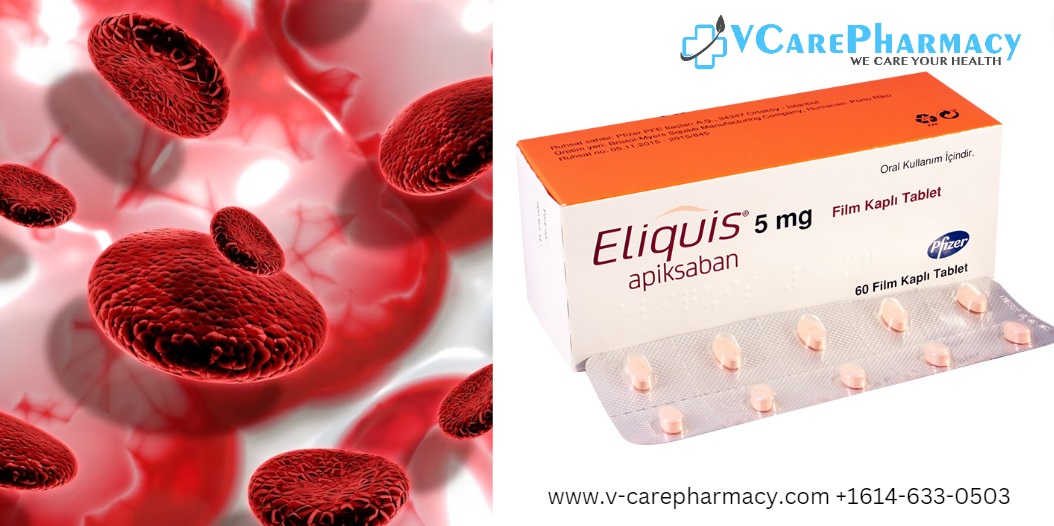
Learn about Eliquis (Apixaban), its usage, risks, and precautions for optimal safety. Consult your healthcare provider for guidance."
Eliquis 5 mg, a brand name for apixaban, belongs to a class of medications known as anticoagulants or blood thinners. It's commonly prescribed to reduce the risk of stroke and blood clots in people with atrial fibrillation, treat deep vein thrombosis, or prevent pulmonary embolism after certain surgeries.
Eliquis 5 mg(apixaban) works by inhibiting specific clotting factors in the blood, particularly Factor Xa. By doing so, it interrupts the clotting process, preventing the formation of potentially harmful blood clots.
One of the significant advantages of Eliquis 5 mg lies in its effectiveness in reducing the risk of stroke with a lower tendency for bleeding compared to some other anticoagulants. However, as with any medication, it carries potential risks.
The risk of experiencing a blood clot while on Eliquis varies based on individual health factors, dosage adherence, and the condition being treated. While Eliquis significantly reduces the likelihood of clot formation, it's not entirely without risks.
Several factors contribute to the probability of blood clot occurrence during Eliquis use:
Studies have shown that Eliquis demonstrates a substantial reduction in the incidence of blood clots compared to alternative medications. However, it's essential to acknowledge that no medication can eliminate the risk of clotting events.
While Eliquis(apixaban) is effective, there are measures individuals can take to further mitigate clotting risks:
Following the prescribed dosage and adhering to doctor-recommended lifestyle changes, such as maintaining a healthy diet and regular exercise, can complement the medication's efficacy.
Regular check-ups and consistent communication with healthcare providers are essential. Reporting any unusual symptoms or concerns promptly allows for timely adjustments in treatment if necessary.
Avoiding activities that might increase the risk of bleeding, such as excessive alcohol consumption or engaging in high-risk sports, can also contribute to minimizing clotting risks.
Avoid Skipping Doses: Ensure strict adherence to the prescribed dosage schedule. Missing doses can reduce its efficacy in preventing blood clots.
Limit Alcohol Intake: Excessive alcohol consumption can increase the risk of bleeding while on Eliquis. It's advisable to moderate or avoid alcohol altogether.
Be Cautious with Other Medications: Certain medications, including over-the-counter drugs and supplements, might interfere with Eliquis. Always consult your healthcare provider before starting any new medication or supplement.
Avoid High-Risk Activities: Engaging in high-risk sports or activities that could result in injury should be approached cautiously. Eliquis may increase the tendency for bleeding from minor injuries.
Consult Before Dental Procedures or Surgeries: Inform your dentist or surgeon about your Eliquis usage before any dental procedures or surgeries. Adjustments might be needed to minimize bleeding risks.
Be Mindful of Bleeding Symptoms: Pay attention to any unusual bleeding or bruising. Contact your healthcare provider immediately if you notice prolonged bleeding, blood in urine or stool, or excessive bruising.
Maintain Consistent Communication: Regularly communicate with your healthcare provider. Any changes in your health status or concerns should be promptly discussed for appropriate guidance.
In conclusion, while Eliquis 5 mg(apixaban) significantly reduces the likelihood of blood clot formation in individuals with specific medical conditions, it's imperative to understand that no medication is entirely risk-free. The chances of experiencing a blood clot while on Eliquis are generally lower compared to other alternatives, but individual health profiles and adherence to prescribed guidelines play pivotal roles in mitigating risks.
For comprehensive insights and accurate guidance concerning Eliquis usage and associated risks, consulting a healthcare professional remains crucial.
Secure, direct ordering: no middlemen, straight from the manufacturer!.
Bin Jarish building,
Deira Dubai, UAE
infovcarepharmacy@gmail.com
+1-614 (887) 8957
DISCLAIMER: This Site Is Not Intended To Provide Diagnosis, Treatment Or Medical Advice. Products, Services, Information And Other Content Provided On This Site, Including Information That May Be Provided On This Site Directly Or By Linking To Third-Party Websites Are Provided For Informational Purposes Only. Please Consult With A Physician Or Other Healthcare Professional Regarding Any Medical Or Health Related Diagnosis Or Treatment Options. The Results From The Products May Vary From Person To Person. Images shown here are for representation only, actual product may differ.
Copyright © v-carepharmacy. All Rights Reserved.